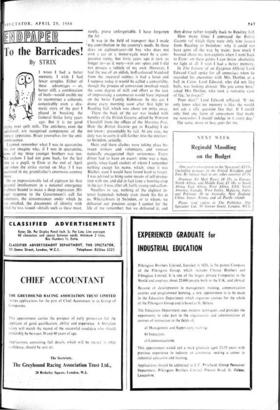To the Barricades!
By STRIX
I cannot remember what I was in quarantine -or, nor imagine why, if I was in quarantine, none of my three younger brothers was too. But anyhow I had not gone back, for the last lime as a pupil, to Eton at the end of April end when the strike started on May 3 I was quartered in my grandfather's enormous country house.
On an impressionable lad of eighteen his first rcrsonal involvement in a national emergency tk almost bound to make a deep impression. His cseer response to the Government's call for Volunteers, the circumstances under which he enrolled, the documents of identity with hich he was issued—details such as these must,
surely, prove unforgettable. I have forgotten the lot.
It was in the field of transport that I made Amy contribution to the country's needs. In these days an eighteen-year-old boy who does not own a car or a motor-cycle must be a com- parative rarity, but forty years ago it took us longer to—as it were—win our spurs and I did not possess a vehicle of my own. However, 1 had the use of an oldish, buff-coloured Standard from the ancestral stables: it had a hood and I suppose today it would be called a convertible, though the process of conversion involved much the same degree of skill and effort as the task of improvising a catamaran would have imposed on the Swiss Family Robinson. In this car I drove every morning soon after first light to Reading Jail, which was about ten miles away.
There the back of the car was loaded with bundles of the British Gazette, edited by Winston Churchill from the offices of the Monnin' Post. How the British Gazette got to Reading I do not know: presumably by rail. At any rate, my duty was to carry it still farther into the interior: to Swindon, actually.
Here and there clashes were taking place be- tween strikers and volunteers, and rumour naturally exaggerated their seriousness. Every driver had to have an escort; mine was a nice, gentle, whey-faced student of whom I remember nothing except his name, which, since it was Blather, even 1 would have found hard to forget. I was advised to bring some means of self-protec- tion with me, and did in fact keep a hunting-crop in the car: I was, after all, fairly young and callow.
Needless to say, nothing of the slightest in- terest happened; nobody even shook his fist at us. Whereabouts in Swindon, or to whom, we delivered our precious cargo I cannot for the life of me remember; but we delivered it, and then drove rather torpidly back to Reading Jail.
How many times I conveyed the British Gazette (of which there were only nine issues) from Reading to Swindon: why it could not have gone all the way by train: how much I boasted about my non-exploits when I went back to Eton—on these points I can throw absolutely no light at all. I wish I had a better memory.
In The Leisure of an Egyptian Official Lord Edward Cecil spoke for all amnesiacs when he recorded his encounter with Mrs Dorline at a ball in Cairo. Lord Edward, who did not like balls, was looking distrait. `Do you come here,' asked Mrs Dorline, who took a romantic view of life, `to forget?'
'Poor dear!' Lord Edward reflected. 'If she only knew what my memory is like, she would not ask a silly question like that. If I could only find any form of amusement that made me remember, I should indulge in it every day.'
The same, more or less, goes for me.










































 Previous page
Previous page